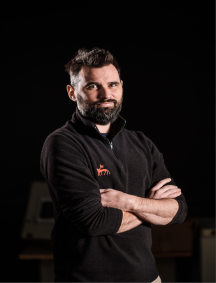Frédéric Bouchard
Doctorate in Earth sciences, 2013
Assistant Professor, Department of Applied Geomatics, Université de Sherbrooke
“The INRS offers numerous advantages: a great scientific and human experience and access at all times to ultra-modern laboratories equipped with all the equipment needed to perform analyses in an efficient and automated manner.”
Passionate about science as a whole and the Earth sciences in particular, our graduate Frédéric Bouchard is driven by the desire to make knowledge accessible to as many people as possible. He is also an advocate of atypical career paths, bridging the gap between the academic world and other sectors, and is interested in research in northern terrains.
It was his bachelor’s degree in geology that brought Bouchard to James Bay and inspired him to explore northern soils further and to undertake a master’s degree during which he became interested in the links between permafrost, climate and landscape in Nunavik. He then worked as a geologist in a salt mine in the Magdalen Islands and as a tour guide in a tourist resort, where he combined his interests in geology and landscapes. He then taught Earth sciences at the college level. While wondering whether to pursue a career in teaching or research, he learned that Professor Pierre Francus—an expert in environmental sedimentology whom he had met at a conference while studying for his Master’s—was looking for a PhD student for a thesis project on Nunavik lakes, in line with his previous experience.
This led him to undertake doctoral studies at INRS Centre Eau Terre Environnement research centre, from 2007 to 2012. He takes away “a great scientific and human experience,” where he was given considerable autonomy and latitude, with a good dose of humor. According to him, “INRS offers great advantages: access at all times to ultra-modern laboratories equipped with all the equipment needed to perform analyses in an efficient and automated manner,” he says. “In addition, INRS and the Geological Survey of Canada are located in the same building, which makes for exceptional corridor discussions,” he adds. As part of his research that combines water and Earth sciences, he has enjoyed rich interactions with professors Isabelle Laurion, an expert in aquatic ecology, and Charles Gobeil, an expert in sediment dating.
Thanks to the warm welcome from all the staff, including Jean-Daniel Bourgault in the library, as well as Stéphane Prémont and Lise Rancourt in the laboratories, he felt at home at INRS. He also acquired essential skills for a researcher, including a scientific work method and writing skills. His experience at INRS also fueled his dream of becoming a university professor, which proved to be a “furiously competitive” pursuit.
After what he describes as a winding path, and following a four-year post-doctoral fellowship in France as part of the “Make Our Planet Great Again” international collaborative project call that led him to manage a team on the ground in Siberia, and then to various course loads, in 2021 he obtained a position as an assistant professor in the department of applied geomatics at the Université de Sherbrooke, where he continues to pursue his passion for research and teaching. He feels that his diverse work experiences have helped him achieve his goal.
He encourages students to “be creative and never stop coming up with new ideas and projects.” He adds, “Positions in companies, government, everywhere in the non-academic professions all require skills acquired at INRS, such as knowing how to manage a project, write a report, work in a team, be present in the field. These are transferable and essential skills, whether or not you land a career in research,” he adds. “I never really had a career plan. There is no one particular path, you can take breaks between degrees, you can work in different sectors, follow your interests... The important thing is to use your knowledge and your know-how, your knowledge and your experience,” he concludes.
It is this principle that makes science popularising a common thread in his career to date. The publication in November 2022 of his mainstream essay, Ici, la Terre. Dix aventures scientifiques qui ont changé notre image du monde [Here on Earth. Ten scientific adventures that have changed our image of the world] is another demonstration of his quest.
[As interviewed in September 2022.]

